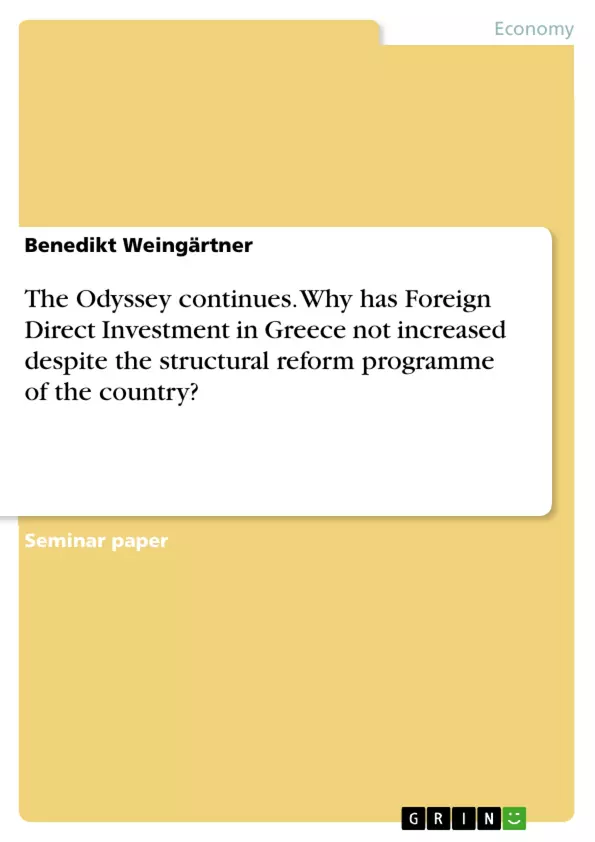After having experienced an economic boom at the beginning of the 2000s subsequent to the admission to the Eurozone, which had been however mainly driven by low interests on financial loans to the private and the public sector, Greece became de facto insolvent in 2010. In the aftermath of a global financial, banking and economic crisis, the country’s public finances became problematic to an extent at which private investors were only willing to lend money to Greece at interest rates which it could no longer afford to pay.
An official bankruptcy could only be prevented by a financial rescue programme granted by the other Eurozone members and the International Monetary Fund in May 2010, giving bilateral credits summing up to 110 billion Euros in order to service existing debt.
The bailout programmes were granted on the condition of a “cash for reform approach”. One objective of this approach was to create economic growth and new jobs in the country afflicted by high unemployment rates for decades. Many economists however stated that Greece could only sustainably overcome its economic and public debt crisis if the country was to become more attractive for Foreign Direct Investment (FDI).
Inhaltsverzeichnis (Table of Contents)
- Introduction - The sovereign debt crisis in Greece, the bailout programmes and structural reforms
- Foreign Direct Investment - A driver for economic stability, growth and jobs
- The Greek paradox - profound structural reforms and more budget discipline but less FDI
- Political and economic reasons for regressive FDI in Greece
- Political and economic implications for the future of Greece
Zielsetzung und Themenschwerpunkte (Objectives and Key Themes)
This paper examines the paradoxical situation in Greece, where despite significant structural reforms and improved budget discipline, foreign direct investment (FDI) has not increased as anticipated. The paper investigates the underlying political and economic factors contributing to this phenomenon and explores the implications for the future of Greece.
- The impact of the sovereign debt crisis and subsequent bailout programmes on Greece's economy.
- The role of structural reforms in attracting FDI and promoting economic growth.
- The challenges and obstacles hindering FDI in Greece despite reforms.
- The political and economic implications of the lack of FDI on Greece's future.
- The potential for future economic recovery and stability in Greece.
Zusammenfassung der Kapitel (Chapter Summaries)
- Introduction - The sovereign debt crisis in Greece, the bailout programmes and structural reforms: This chapter provides background information on the sovereign debt crisis that engulfed Greece in 2010, leading to a series of bailout programmes from the Eurozone and the International Monetary Fund. The chapter explains the circumstances that led to the crisis and the conditions attached to the bailout packages, focusing on the structural reforms mandated for Greece.
- Foreign Direct Investment - A driver for economic stability, growth and jobs: This chapter delves into the concept of Foreign Direct Investment (FDI) and its potential to stimulate economic growth and job creation in recipient countries. The chapter draws on theoretical frameworks and empirical research, highlighting the positive effects of FDI on economies and outlining the factors that contribute to attracting FDI.
- The Greek paradox - profound structural reforms and more budget discipline but less FDI: This chapter presents the seemingly paradoxical situation in Greece, where despite substantial structural reforms and improved fiscal management, FDI has not increased as expected. This chapter investigates the underlying reasons behind this phenomenon, focusing on the factors that are preventing FDI from flowing into Greece despite its efforts to improve its economic environment.
Schlüsselwörter (Keywords)
The primary focus of this text is on the relationship between structural reforms, foreign direct investment (FDI), and economic stability in Greece. It explores the economic consequences of the sovereign debt crisis, the role of bailout programs, and the potential for Greece to overcome economic challenges through structural reforms and increased FDI. Key terms include: sovereign debt crisis, bailout programs, structural reforms, foreign direct investment, economic stability, and economic growth.
Frequently Asked Questions
Why did Greece experience a sovereign debt crisis in 2010?
The crisis was driven by high public debt and low interest rates on loans in the early 2000s, leading to insolvency when private investors refused to lend more money at affordable rates.
What was the "cash for reform" approach?
It was a condition of the bailout programs where Greece received financial credits in exchange for implementing strict structural reforms and budget discipline.
What is the "Greek paradox" mentioned in the paper?
The paradox describes the situation where Greece implemented profound structural reforms, yet Foreign Direct Investment (FDI) failed to increase as expected.
Why is FDI important for Greece's recovery?
Economists argue that FDI is essential for sustainable growth, job creation, and overcoming the long-term debt crisis.
What are some political reasons for regressive FDI in Greece?
The paper investigates political instability and economic uncertainty as key factors that deter foreign investors despite the ongoing reforms.
- Quote paper
- Benedikt Weingärtner (Author), 2017, The Odyssey continues. Why has Foreign Direct Investment in Greece not increased despite the structural reform programme of the country?, Munich, GRIN Verlag, https://www.grin.com/document/373596



